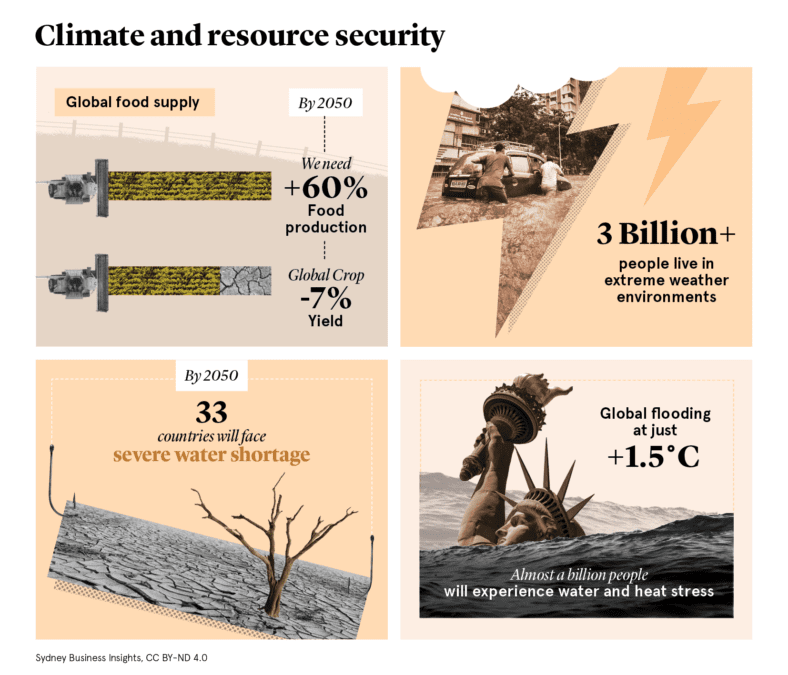气候资源的安全
常规模式带来了一个更富裕的世界和一个退化的地球。
气候与资源安全大趋势反映了气候变化的轨迹及其对自然资源带来的压力。
除非国际社会共同努力,2030年前将温室气体排放量至少减少50%,否则到下一个十年中期,全球平均气温将比工业化前上升1.5摄氏度以上。
即使按照这样的速度,一些群体和生态系统也将无法生存。
超过30亿人生活在极易受到极端天气事件影响的地区。
即使气温上升1.5摄氏度,世界上近四分之一的人口也将面临洪水,近10亿人将面临水危机和高温压力。
目前,世界上大约一半的人口至少在全年部分时间里经历着严重的水资源短缺。如果这个趋势继续下去,到2040年,33个国家将面临严重的水资源短缺。
为了养活全球人口,到2050年,粮食产量需要提高60%。然而,由于气候变化,全球农作物产量将下降7%。
海产品是30多亿人的主要蛋白质来源。然而,到本世纪末,海洋变暖和过度捕捞将使世界鱼类资源减少64%。
避免这一大趋势将需要适应和减缓战略。
基于生态系统的适应(或绿色基础设施)利用自然解决方案来保护和恢复陆地和海洋,从而保障粮食安全,为当地带来经济效益,并促进碳封存。
例子包括种植红树林作为一种防洪形式,以及“绿色长城”项目,在该项目中,21个非洲国家正在种植一个与非洲大陆宽度相当的巨大树木带,以对抗撒哈拉沙漠的蔓延。
到2021年,全球约12%的一次能源来自可再生能源。为了到2050年实现净零排放,超过三分之二的能源消耗将需要来自可再生能源。
世界迫切需要更积极的脱碳战略。实施有效的计划将需要更强有力的国际合作。 一如既往的常规模式已不再是可行的模式。
Plumer, B. (2023). ‘Climate Change Is Speeding Toward Catastrophe. The Next Decade Is Crucial, U.N. Panel Says.’, New York Times 20/3/23. Available at: https://www.nytimes.com/2023/03/20/climate/global-warming-ipcc-earth.html
Slezak, M. (2023). ‘IPCC climate scientists issue ‘a survival guide for humanity’, warning window closing to reduce emissions’, ABC News 21/3/23. Available at: https://www.abc.net.au/news/2023-03-21/ipcc-report-how-to-keep-global-warming-below-1-5-degrees/102112836
Meyer, C. (2022). ‘3.3 Billion People are Highly Vulnerable to Climate Change,’ Security Management. Available at: https://www.asisonline.org/security-management-magazine/latest-news/today-in-security/2022/march/three-billion-people-highly-vulnerable-to-climate-change/
Rentschler, J., Salhab, M., Jafino, B.A. (2022). ‘Flood exposure and poverty in 188 countries,’ Nature Communications 13. Available at: https://www.nature.com/articles/s41467-022-30727-4
Maddocks, A., Young, R.S., Reig, P. (2015). ‘Ranking the World’s Most Water-Stressed Countries in 2040’, World Resources Institute. Available at: https://www.wri.org/insights/ranking-worlds-most-water-stressed-countries-2040
Intergovernmental Panel on Climate Change (IPCC) (2023). Climate Change 2023 – Synthesis Report. Available at: https://report.ipcc.ch/
Da Silva, J.G. (2012). ‘Feeding the World Sustainably’, UN Chronicle. Available at: https://www.un.org/en/chronicle/article/feeding-world-sustainably
Menendez, P., Losada, I.J., Torres-Ortega, S., Narayan, S., Beck, M.W. (2020). ‘The Global Flood Protection of Mangroves’, Nature Scientific Reports. Available at: https://www.nature.com/articles/s41598-020-61136-6
United Nations’ Convention to Combat Desertification (2023). Great Green Wall Initiative. Available at: https://www.unccd.int/our-work/ggwi
International Energy Agency (2022). Energy System Overview. Available at: https://www.iea.org/reports/energy-system-overview
International Energy Agency (2021). ‘Net Zero by 2050: A roadmap for the energy sector’. Available at: https://iea.blob.core.windows.net/assets/deebef5d-0c34-4539-9d0c-10b13d840027/NetZeroby2050-ARoadmapfortheGlobalEnergySector_CORR.pdf

We believe in open and honest access to knowledge. We use a Creative Commons Attribution NoDerivatives licence for our articles and podcasts, so you can republish them for free, online or in print.





